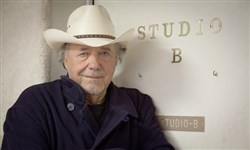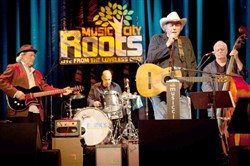VOL. 37 | NO. 6 | Friday, February 8, 2013
Bare finds right label for dream folk album
By Tim Ghianni

Bobby Bare says he waited "20-25 years" to record his Plowboy Records release of folk classics.
-- Photo Courtesy Of Shannon Pollard, Plowboy RecordsBobby Bare has a simple explanation for why it took him 25 years to put out his dream album of folk songs.
“There’s no demand for an old fart doing an album,” the affable 77-year-old shrugs.
There is irony in the fact that the album of folk songs, “Darker Than Light” – when finally realized – was put out by Plowboy Records, owned by the grandson of Nashville’s Countrypolitan king Eddy Arnold.
Forty years ago, Bare was at the vanguard of so-called “Outlaws” movement, marketed as the antithesis to the lush strings, Floyd Cramer slip-note piano and smoking jackets-feel of “The Nashville Sound.”
Arnold was to that sound what Sinatra was to cigarette-filled-saloon songs: He was Chairman of the Board.
And yet it’s Arnold’s grandson, Shannon Pollard, who gave Bare the opportunity to do something that again is so against the grain of Music Row, where releasing an album of an older, thicker guy singing folks songs is about as likely as Taylor Swift singing that she is going to get back together with that guy after all.
Pollard and his partners -- Don Cusic, Arnold’s friend and biographer, and iconic punk rocker Cheetah Chrome – chose to launch their new Plowboy Records label with just such a record.
Bare and the musicians who backed him in the studio – Robert Plant’s Band of Joy: Guitarists Buddy Miller and Randy Scruggs, bassist Byron House, drummer Marco Giovino and more – launched that record last November during a Music City Roots show at the Loveless.
Plowboy Records Sound
Pollard says issuing the Bare album fit nicely with the vision of the company.
“The original intent is to promote and preserve the legacy of Eddy Arnold,” he says.
“But we do want to look beyond that and provide artists a place to land and really put out product where the ultimate litmus test is making something that would motivate me to go into a record store and buy it….

Bobby Bare performs with his band during November’s Music City Roots show at the Loveless.
-- Photo Courtesy Of Shannon Pollard, Plowboy Records“You know what’s cool about that record is it embodies a philosophy that I have that we all share.”
“The Plowboy Records Sound” – the calling card for future efforts – was pretty much defined by how Bare’s masterful album was made, informally and pretty much live in the studio.” The way Eddy Arnold used to do it.
“I’ve been wanting to do this album for 20-25 years,” Bare says. “I just love these old folk songs. The melodies are so great, the songs are so far-out and real. It’s what happens: A guy would take his knife and stab his girlfriend and he’d run. They’d go after him, catch him and hang him.”
His booming laugh explodes and he adds: “That’s what about four of those songs are about.”
“My friend Tom T. (Hall) said folk songs back in their day was the CNN of that day. Every time they knew something had happened, they’d write words to it” and put it to the tune of any other popular folk song.
“I’m not interested in doing what everybody else is doing, because by the time everybody else is doing something, I’m tired of it. I’m more than comfortable in doing the exact opposite,” Bare adds.
Too many popular artists now “are singing for the money, playing like this because the record company told them to.”
‘A new way to do it’
He did “Darker Than Light” because it was the record he wanted to do. And he’s thankful that Pollard and his cronies by design go against the grain.
“The record companies that exist now, nobody wanted to touch a record like this,” says Bare. “If you went to them and mention the fact ‘I want to do an album of folk songs and treat them just like they are, really good songs, which they are,’ that’s not something that the modern-day record companies would have been interested in.
“The record companies, for all purposes, don’t exist anymore, at least the way we know it … so it’s time for somebody to come up with a new way to do it. If not Shannon, then somebody like him who is willing to put his money where his mouth is and jump in and do things outside the box.”
Silverstein’s collection
Four decades back, outside-the-box thinking led to the founding of the Outlaws, a movement whose legend outshines its substance. Bare was at the head of the table because his Music Row office back then was a gathering place for what Billy Joe Shaver called “lovable losers and no-account boozers” (not to mention guitar-pickers, pinball-wizards and knife-throwers like Waylon Jennings, Tompall Glaser, Captain Midnight and Billy Ray Reynolds.)
Music Row romantics might have bought into the notion that those men were revolting against the Countrypolitan sound, but to Arnold-chum Bare, it was “a promotional gimmick” hijacked by the marketers.
But he was responsible for its biggest accomplishment, as in his own search for artistic freedom he bartered with Chet Atkins and RCA for the right to produce his own records, eventually allowing him to make a full collection of songs written by Shel Silverstein.
The resulting “Lullabys, Legends and Lies” – released in 1972 – is, in many ways, similar to the new Bare release. While not a collection of classic folk songs, it does feature story songs from the lively mind of Silverstein.
When Bare debuted it at the Exit/In 41 years ago, it brought the rock and country worlds together, with Neil Young, a Nashville regular, and Dickey Betts of the Allman Brothers playing guitar, while Silverstein sat at one of the tiny tables in what was – then – more an intimate venue than today’s warehouse barn.
Forgotten Outlaw no more
While the freedom he had back then opened the floodgates for other artists to gain more control over their product, it wasn’t all necessarily good, Bare says.
His friend, Jennings, followed him in getting artistic freedom from Atkins and RCA, and Bare blames himself for the result.
Jennings’ effort was “Honky Tonk Heroes,” a collection of mostly Billy Joe Shaver songs that is to many an Outlaws touchstone.
Bare regards it as “sub-par” and “coked-up” work by one of his best friends. “It wasn’t Waylon. It was Billy Joe,” he says.
With the exception of Willie Nelson, the Outlaws who haven’t died have largely been forgotten or abandoned by Music Row.
Bare actually kind of blundered into the opportunity to go against the grain again with the inaugural Plowboy record. He was at a book-release party for musician/writer Marshall Chapman, when he ran into Cusic.
“I’ve known him since he was a teenager,” says Bare. “Cusic used to hang out at my office all day and sleep in his car at night. Back then he had a whole lot of long hair and he was cute. He hanged out with me and Waylon.”
Cusic not only enjoyed the rowdy company, he survived to become an academic, a producer, an author and now label co-owner.
At the book-signing encounter, Cusic “told me that him and Shannon Pollard were working on putting together this record label.
“I said ‘What kind of stuff you gonna record?’
“They said ‘We want to do an album of folk songs or old cowboy songs,’ and I said, ‘Well, you come to the right guy.’”